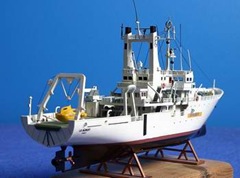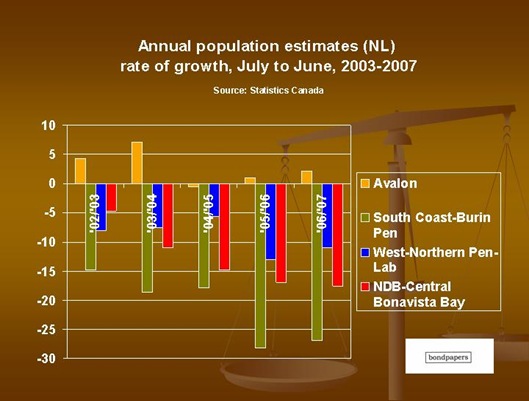Government Operations
The public consultation process on the development of the strategic economic plan highlighted people's feelings that they are over governed. The public feels the Province is over-regulated, that Government is too inflexible, rigid and complex, and that there is a definite need for a change in the attitudes and commitments of politicians, bureaucrats and the general population alike. People expressed a great deal of frustration about the number of development agencies and the confusion, duplication and red tape which they create. The public emphasized the need for better co-ordination between both federal and provincial agencies; the need for front-line managers to make decisions; the need for government officials to have more flexibility in making business decisions; the need to streamline the process to speed up decision making; and the need for educational and training initiatives within Government to provide public servants with sound management skills, and which would stress the importance of providing quality service to businesses.
Government itself has recognized these concerns and has already taken action to address them. The Province has made considerable progress toward reducing duplication with the consolidation of its business support activities within Enterprise Newfoundland and Labrador, which has also been mandated to co-ordinate regional activities.
The current challenge to Government is to provide better service in a time of diminishing resources and increasing demands for service. Government is, therefore, now committed to the introduction of a long-term program to improve the quality of service to clients. This "service quality initiative" will be a comprehensive approach intended to transform Government's organization from a process-oriented system to a supportive client-focused, results-oriented system. This will require continuous support and commitment from management and an emphasis on open communication, teamwork, innovation and training.
While the greater decentralization of decision making was a recurrent theme in the public hearings of the Royal Commission on Employment and Unemployment six years ago, the issue did not generate as much interest in the public consultations for this strategic economic plan. This may reflect satisfaction with the decentralization of decision making now in effect in the five ENL regions. Government believes that rather than imposing regional decisions from the top, it is better to let regional organizations emerge as needed from the community level.
During the public consultation process the public did indicate a desire for improved co-ordination among departments, more decision making at the local level, a greater sensitivity by regulatory departments and agencies to economic development issues, and an improved attitude and commitment from the existing political and bureaucratic system. There was also general agreement that Government should not be the operators of businesses but instead should establish a positive economic climate for the private sector.
Strategy Statement. The Province mil take steps to ensure that the structures and processes of government departments, particularly those involved in economic development, are streamlined to provide for greater efficiencies and responsiveness in delivering services to the public. Government mill become more focused on serving the client. Likewise, the public will have to recognize that government funding and programs are not limitless and priorities will have to be established for the provision of services.
Actions. The Province will:
30. Establish, within each Enterprise Newfoundland and Labrador region, a process to allow for the better co-ordination of economic development activities across all applicable provincial government departments and agencies. ENL will take the lead in the process by establishing regional groups composed of the senior official of each of these organizations to:
- share information on respective activities and priorities in the region;
- improve the timing of decision making on economic development activities;
- assist in developing a client-Centre approach to program delivery within all departments and agencies working in the regions, particularly programs relating to administrative and regulatory functions affecting economic development decisions;
- advise departments on the appropriate level of authority that should be delegated to local and regional offices;
- establish guidelines which give priority to processing proposals or applications related to economic development; and
- recommend courses of action to co-ordinate federal and provincial
activities related to economic development, and to reduce duplication of government services and programs.
31. Avoid providing services where they can be provided by the private sector.
32. Implement a Service Quality Program within the public service. This program will make the public service more client oriented, permit more flexibility and accountability within the system, provide for a more decentralized approach to program decision making and ensure a simplification of rules, policies and procedures.
33. Request the Advisory Council on the Economy to make periodic reports and recommendations to the President of the Executive Council on the need for improving the efficiency and effectiveness of government services delivery.
34. Continue the review and elimination of the various fees and licences which directly affect economic development initiatives.
Tax Initiatives
The Province must ensure that its business tax climate will complement its economic development objectives. Both established and new businesses must be assured that the tax regime is fair and equitable. The tax regime has to be structured to provide a business environment conducive to investment and economic growth, and we must remove disincentives which keep businesses from locating here. Although the overall tax burden on businesses in Newfoundland and Labrador is less than in Canada as a whole, it is currently somewhat higher than in the other Atlantic Provinces.
Responsible tax reform must recognize that the Province has to operate within the constraints of Federal-Provincial tax agreements and has to generate a sufficient revenue base to maintain an acceptable level of public services.
Strategy Statement. To strengthen the Province's ability to attract new investment, Government will intensify its comprehensive examination of the tax system in consultation with the business community and others. The Province will ensure that the tax system encourages economic development, and that the private sector operates under a tax system that allows local businesses to compete equitably with those in other jurisdictions.
Actions. The Province will:
35. Pursue at the earliest opportunity harmonization of the provincial Retail Sales Tax (RST) and the federal Goods and Services Tax (GST) and provide full input tax credits for RST. Harmonizing the two taxes will greatly reduce the tax burden on business, stimulate increased economic activity in many important areas and be essential for international competitiveness in the long term.
36. Adjust taxes where it can be demonstrated that these would have a positive impact on investment and economic growth without compromising the overall fairness and efficiency of the tax system.
The Province will move to reduce the corporate tax rate for small businesses, including small manufacturing and processing businesses, to 5% from the current level of 10%. In addition, the current general manufacturing and processing rate will be reduced to 7.5% from 17.5%, and the general corporation tax will be reduced to 16% from the present rate of 17%.
37. Conclude the review of our mining tax regime and make amendments which will ensure a positive climate for investment in mineral development in the Province.
38. Recommend a standardized common assessment base for municipal business taxes, with particular emphasis on the tax burden on capital and equipment.
39. Investigate the feasibility of using the tax system to encourage an employee equity-investment program.
Innovation and Technology
Our past and future economic circumstances are tied closely to export markets. Economic considerations associated with geography and proximity to markets are, however, decreasing in significance. Instead, technological development and adaptation are becoming important determinants of competitiveness.
The Province's low level of productivity and slow adoption of new technologies have constrained economic growth and development in the past and will continue to do so unless our industries increase their use of new technology. The Province will therefore actively implement its Science and Technology Policy to ensure that industry is technologically equipped, and capable of competing locally, nationally and internationally.
Government will also play a proactive and sustained role in concert with research institutions and the private sector in pursuing new areas of technological development. Although this will inevitably result in some risks and additional costs, it will produce better links between institutions, governments and the private sector. Emphasis will be placed on marine-oriented industries where we already have a comparative advantage, as well as on other industries which demonstrate they can develop competitive advantages.
Strategy Statement. The Province will demonstrate to the private sector that innovation through technology development and adaptation is essential to improved productivity and competitiveness. Programs mil be made available to the private sector to develop competitive advantages through the transfer of technology-Actions. The Province will
40. Implement programs to develop further expertise in our research institutions and business community focusing on marine activities, including communications, the sciences, cold-oceans engineering, food and fish processing, and related manufacturing, as well as cold-oceans technologies related to offshore oil and gas exploration and development, and to promote this expertise internationally.
41. In partnership with the Federal Government, implement programs to commercialize and market new technologies, products and processes, and to encourage quality enhancement, plant modernization and training.
42. Within the bounds of national and international trade agreements, develop a strategic procurement program aimed at research companies who have the potential to become competitive suppliers of goods and services in domestic and external markets.
43. Assist Memorial University and other post-secondary institutions to develop better links and partnerships with the private sector and to market more aggressively the capabilities of local research institutions and organizations.
44. Reallocate human resources within Government to give priority to the implementation of the Science and Technology Policy and to work with industry and the general public to demonstrate the importance of a technologically progressive society.
Environmental Initiatives
The past decade has seen a sharp rise in environmental awareness and concern throughout the world. The Province recognizes the potential economic consequences of such problems as global warming, acid rain and changes in the stratospheric ozone level. While we may not have a large impact on the global situation, we accept our responsibility to help resolve these issues. We will also seek solutions to our own problems, such as waste management, and will continue to participate in efforts to protect and restore the natural environment wherever it is threatened.
Vast areas of Newfoundland and Labrador remain unspoiled and must be protected for future generations. However, our environment is also an important economic asset which must be used wisely. Tourism and recreational fishing, for example, are directly dependent on a clean environment.
All resource developments will be properly managed to ensure they are implemented in accordance with the principles of sustainable development, incorporating the values of multiple use, considering wildlife habitat, watershed management, recreation and tourism potential. Public input into major developments which impact on our environment will play an integral part in the Province's decision-making process.
Strategy Statement. The Province mil undertake measures to ensure that all development takes place within the framework of an overall sustainable development strategy. The Province has already established its own Round Table on the Environment and the Economy to identify, advance, promote and advise on a strategic framework to reconcile economic and environmental needs.
Actions. The Province will:
45. Implement a sustainable development strategy which ensures an adequate balance between industrial and economic development and environmental concerns.
46. Establish cooperative arrangements with the Federal Government to harmonize and streamline the federal-provincial environmental assessment process, to avoid unnecessary duplication, expense and delays to potential investors, and to ensure consistency in the application of all legislation. The concept of an Environmental Review Agency, operating at arms length from Government, will be examined.
47. Undertake a program to increase awareness of environmental legislation, the sensitivities of ecosystems, and the requirements for environmental assessment.
48. Introduce a new Waste Management Strategy which addresses such issues as recycling, municipal sewage and solid waste disposal, the disposal of toxic and hazardous waste, and clarifies jurisdictional responsibilities for waste management with federal, provincial and municipal governments.
49. Implement new regulations to address the problems of abandoned vehicle wrecks, littering and the indiscriminate use of All-Terrain Vehicles (ATV) in sensitive ecosystems.
50. Examine current policies with regard to the alienation of Crown lands from resource development to allow multiple use, where appropriate.
-srbp-
Change and Challenge: Chapter Five - New opportunities for growth








